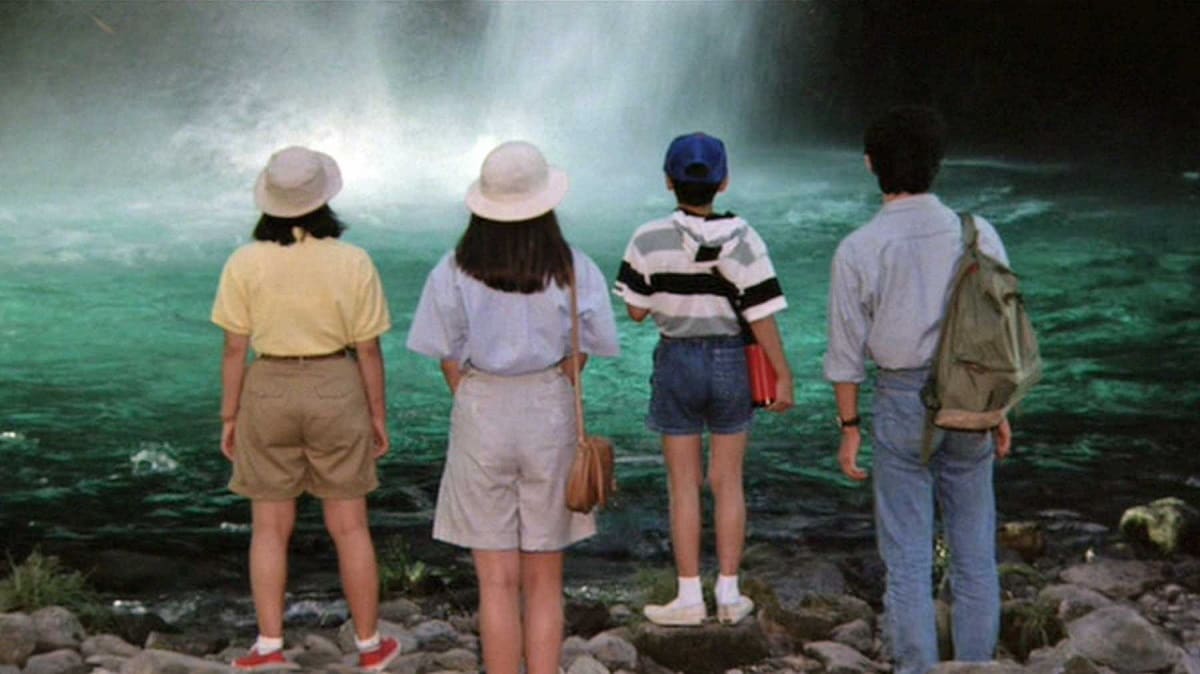The horrors endured by the local populace in Akira Kurosawa’s war drama are felt in every frame, but the film itself is as serene as a Zen garden.
Still from Rhapsody in August
Akira Kurosawa’s Rhapsody in August (1991) is the rare “World War II film” that plays in very quiet registers. The horrors endured by the local populace — the film is set in the surroundings of Nagasaki — are felt in every frame, but the film itself is as serene as a Zen garden. Talking to the writer Gabriel García Márquez in 1990, Kurosawa said, “I have not filmed shockingly realistic scenes which would prove to be unbearable and yet would not explain in and of themselves the horror of the drama. What I would like to convey is the type of wounds the atomic bomb left in the heart of our people, and how they gradually began to heal.”
The film’s centre — and its heart — is an elderly woman, Kane (Sachiko Murase), who lost her husband when Nagasaki was bombed. He was a teacher, and his school was close to the blast centre. “The school building was crushed flat and burned, and full of charred bodies. It was impossible to identify which one of them was Grandpa,” says one of Kane’s four grandchildren, who are staying with her while their parents are visiting the US. Kane represents the Japan that still remembers — as opposed to the numerous Japanese who, lulled by post-War prosperity and renewed ties with the US, have succumbed to amnesia over the event. Kane’s school-going grandchildren are part of this generation. It’s only now, while staying with Kane, that they venture out to Nagasaki, see for themselves what really happened.
And Clark (played by Richard Gere) represents America. He’s the son of Kane’s older brother, who emigrated to the US and became a millionaire. Towards the end of the film, he visits Kane and witnesses a memorial service being performed at the school Kane’s husband worked in. The scene plays out very quietly, without an iota of sentiment or melodrama — yet it’s as though we’re hearing a thousand silent screams. The people (some of them are blind) performing this service are classmates of the children who died here, “the people who witnessed the worst fear”.
Another simple, yet powerful scene, has Kane being visited by an elderly woman. The grandchildren are puzzled, because Kane and the visitor are simply sitting opposite one another, heads bowed, without speaking a single word for over an hour. Later, they ask Kane about it. She says the old lady came by to chat. The grandchildren protest that they didn’t talk at all. Kane replies, “Her husband also died in Nagasaki, just like Grandpa. That’s why she comes here now and then sits down for a while without saying a word, and leaves without saying a word. There are people who say a lot even while staying silent.”
As scenes like these suggest, Rhapsody in August is hardly one of Kurosawa’s greatest, but it wields a quiet power that cannot be dismissed.
Many critics, American and also Japanese, complained that the film simplified the issue around the bombing. The culture critic Inuhiko Yomota was disturbed by the scene where Clark (not just a stand-in for the US, but also played by a big American movie star) apologises to Kane. “I am terribly sorry for not knowing about Uncle,” he says. “You were born and live in Nagasaki. And still, we didn’t realize it. That was wrong of us. We were wrong.”
In Transformation and Stagnation: Japanese Cinema in the 1990s, Yomota wrote that Kurosawa was chauvinistic in his portrayal of “the Japanese as victims of the war, while ignoring the brutal actions of the Japanese and whitewashing them with cheap humanist sentiment”. But in that chat with Gabriel García Márquez, Kurosawa said that the atomic bomb was still killing Japanese, due to the after-effects of radiation. He questioned the American decision to drop the weapon on a city inhabited only by civilians who had nothing to do with the war, who lived far, far away from the military concentrations.
The depth of his feeling is transferred to Kane, who speaks up when her family wonders if it will be a problem talking about the bomb when Clark is visiting. She says, “They did drop the atom bomb, and they resent being reminded of it? If they don’t like it, they don’t have to remember it. But I can’t have them pretending ignorance. They claim they dropped the flash to stop war. It’s already been 45 years now. But the flash hasn’t stopped war. They’re still killing people! But you know, war is to blame. People do anything just to win a war. Sooner or later, it will be the ruin of all of us.”
Is this “cheap humanist sentiment”, as Yomota labelled it? In artistic terms, yes. It’s too blatant a statement. But even if the shape of those words makes you wince, Kurosawa makes you feel what’s going on inside this old woman, to whom the war is as fresh as something that happened yesterday. And if you examine the lines closely, you’ll see her rant isn’t about America dropping the bomb. It’s about the expectation that Clark/America should not be reminded about it. That’s what separates a director from a demagogue. Even when he is being didactic, he doesn’t abandon nuance. War is hell, and no one — not the winners, not the losers — should be allowed to forget this fact.
Baradwaj Rangan is Editor, Film Companion (South).
Find latest and upcoming tech gadgets online on Tech2 Gadgets. Get technology news, gadgets reviews & ratings. Popular gadgets including laptop, tablet and mobile specifications, features, prices, comparison.

